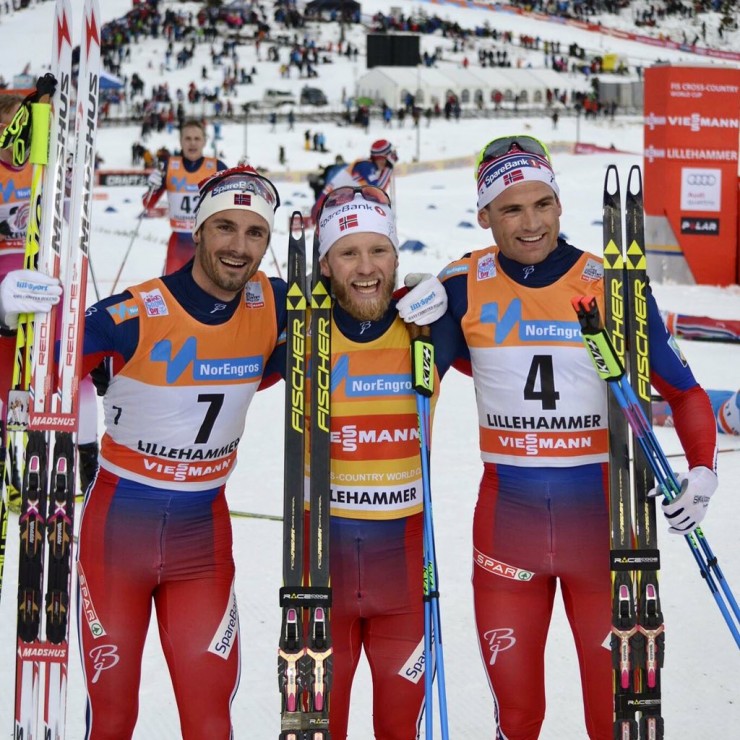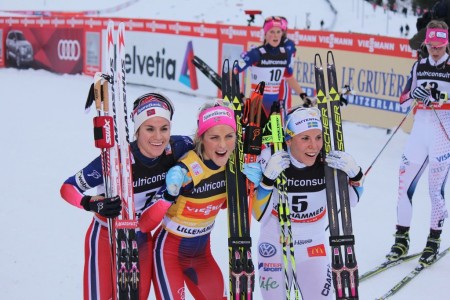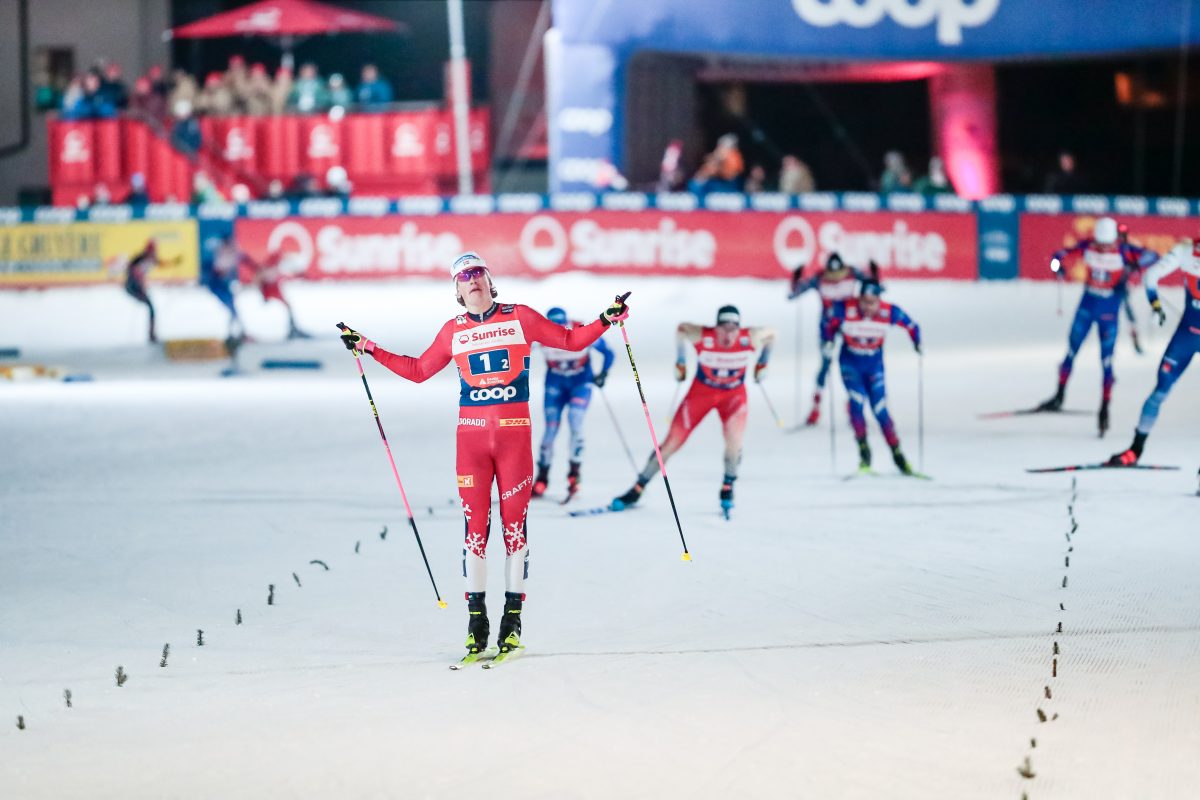
You know when the Norwegian fans are starting to get bored, it’s time for a changeup. That’s not to say Therese Johaug and Martin Johnsrud Sundby shouldn’t win race after race, but let’s at least see them do it against a more varied backdrop.
Then maybe the spectators won’t turn their back on the action while the leader’s still out on the course and head out before the race is finished.
Blame it on the lack of snow; it wasn’t the Lillehammer World Cup organizers’ fault. Racers in Saturday’s 15- and 30-kilometer skiathlons had to round the only 3.75 k loop with enough snow, leaving the men to do it eight times. That amounted to a lot of Sundby skiing in circles by himself.
Johaug attacked off the front out on her own as well for two-thirds of the women’s race, dropping her Norwegian teammate and closest rival this season Heidi Weng between 5 and 6 k.
For Johaug, it was her fourth-straight skiathlon victory. She’s also been on the podium in 10 of her last 11 World Cup or World Championships starts.
“Today it was incredibly fun to go skiing,” said the 27-year-old Norwegian national team member, who previously battled with teammate Marit Bjørgen in past seasons. Bjørgen is out for the majority of this winter as she is expecting her first child this month.
“I’m in very good shape,” Johaug said when asked if she was in the shape of her life. “It was simply a superb day.”

She won by almost a minute and a half, 1:29.3 to be exact, over Weng. The two skied together through 4.6 k, where Weng actually led Johaug. Meanwhile, Sweden’s Charlotte Kalla hung close in third, 2.5 seconds back. The three jumped out to an early lead and dropped the field just four minutes into the race. Johaug went on to win in 42:17 after breaking away on her own on the second of four laps.
By 6 k, Johaug had gapped Weng by 15 seconds, and Kalla was almost 24 seconds back in third. Finland’s Kerttu Niskanen, Germany’s Nicole Fessel, Norway’s Maiken Caspersen Falla, and Austria’s Teresa Stadlober formed a chase pack, but by the ski change at 7.5 k, they were at least 45 seconds back from Johaug in fourth through seventh. Weng was 21 seconds behind at the transition, and Kalla was 29 seconds out of first.
Less than 1 k into the skate leg, Johaug had extended her lead to 33 seconds over Weng and 43 over Kalla. With one lap to go, she was nearly a minute ahead of the field.
“This is a course that fits me like a glove,” Johaug told NRK, according to a translation. “Is that what you say? It fits me amazingly well.”
While Weng was able to outlast Kalla by 0.1 seconds at the finish, the Norwegian runner-up had hoped to stay with Johaug longer.
“Therese Johaug has an extra gear that I don’t have quite yet,” Weng told NRK. “It’s a bit boring that Johaug is so superior…”
“She goes on a completely different level than the rest of us,” Kalla told Dagens Nyheter, according to a translation. “She has a great motor and really gets it out on these [courses].
“Johaug was the big favorite before the season, before they even knew how fast she can go.” Kalla added, explaining that Johaug’s pace wore her down during the initial classic leg. “But I have to hope that it will even itself out over the season and that there will be such large distances all the time.”
While five different nations finished in the top 10 of the women’s race, with Fessel in fourth, Falla in fifth, the Czech Republic’s Petra Novakova in sixth, and Anne Kyllönen and Niskanen in seventh and eighth, respectively, the men’s race wasn’t so diverse.
Sundby led a Norwegian sweep of the top four, with Niklas Dyrhaug, Hans Christer Holund, and Sjur Røthe respectively behind him. The 31-year-old Sundby, who actually won his first World Cup skiathlon (he was a three-time runner-up before Saturday), dropped the field almost as soon as he set out on the 7.5 k skate leg.
The first into the ski change, he came out first, 1.5 seconds ahead of Dyrhaug. Two kilometers later, he was 13 seconds ahead of Holund in second and Dyrhaug in third. Sundby ended up skiing the remaining three laps alone and won in 1:19:22.9. Dyrhaug ultimately bested Holund for second place, finishing 44 seconds after Sundby and 2.9 seconds ahead of Holund.
“I think this is my best race ever,” Sundby, the defending overall World Cup champion told NRK. “I could just go and go. I felt nothing could stop me.”
With nothing between him and the finish except about 14 k to ski alone, Sundby skated to the win. He set a noticeably fast pace from the beginning, and led for the majority of the 30 k from start to finish.
“It was really tough, from the first meters to the finish,” he told FIS. “With the help of Norwegian guys we managed to break away. I could just push all the way. … It was my plan to win as many World Cup points as possible before Christmas. This season, every weekend counts.”
Second and third were personal bests for both Dyrhaug and Holund. For Holund, it was his first World Cup podium. Røthe was 1:13.5 back in fourth, and France’s Maurice Manificat broke up the Norwegian sweep in fifth (+1:18.2). Petter Northug Jr. rose from skiing in the top 20 for much of the classic leg to place sixth (+1:28.5), 0.7 seconds ahead of Norwegian up-and-comer Emil Iversen in seventh. Anders Gløersen was eighth for Norway, Russia’s Stanislav Volzhentsev ninth, and Canada’s Alex Harvey 10th.
On an above-freezing day, classic wax can always be a big question. While it was 39-degrees Fahrenheit and overcast, U.S. head coach Chris Grover said most of the nations had the wax figured out.
Norway is just that good.
“Their men’s team is extremely strong and the Norwegian men and women’s team is the gold-standard team in the world,” Grover said in phone interview after the race. “These athletes are extremely fit right now because they have had to qualify for their World Cup squad over the past couple weeks, they have a home-course advantage, and they know how to wax for Lillehammer. This race over the past couple years has been a challenge for any nation to compete with Norway…”
Johaug and Sundby currently lead the women’s and men’s overall World Cup standings by more than 160 points (ahead of Sweden’s Stina Nilsson and Northug, respectively).
Alex Kochon
Alex Kochon (alexkochon@gmail.com) is a former FasterSkier editor and roving reporter who never really lost touch with the nordic scene. A freelance writer, editor, and outdoor-loving mom of two, she lives in northeastern New York and enjoys adventuring in the Adirondacks. She shares her passion for sports and recreation as the co-founder of "Ride On! Mountain Bike Trail Guide" and a sales and content contributor at Curated.com. When she's not skiing or chasing her kids around, Alex assists authors as a production and marketing coordinator for iPub Global Connection.



